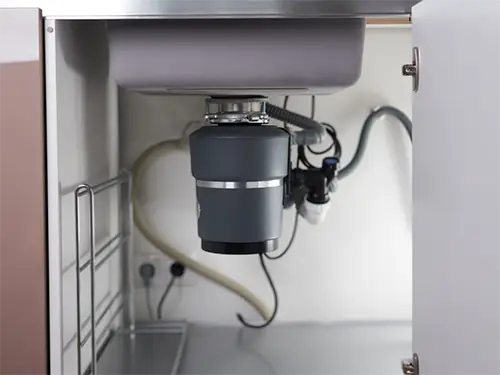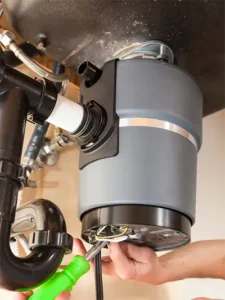 Owning a garbage disposal is one of those small kitchen conveniences that make life easier. It simplifies cleanup and prevents food waste from clogging your kitchen sink. However, improper use and neglect can shorten its lifespan, turning a helpful appliance into a source of frustration.
Owning a garbage disposal is one of those small kitchen conveniences that make life easier. It simplifies cleanup and prevents food waste from clogging your kitchen sink. However, improper use and neglect can shorten its lifespan, turning a helpful appliance into a source of frustration.
The average garbage disposal lasts between 8 and 15 years, but proper care can extend its life beyond the 15-year mark.
In this article, we will look at the main factors that affect how long a garbage disposal lasts. We will also give you practical tips to keep your unit in great shape for as long as possible.
Key Takeaways:
- Garbage disposals typically last 8–15 years.
- Routine maintenance can extend a disposal’s life up to two decades.
- Proper use, cleaning, and inspections are essential to longevity.
- Recognizing signs of wear can help determine whether to repair or replace.
How Long Does a Garbage Disposal Last?
The average lifespan of a garbage disposal is 8 to 15 years. Most people replace them after about 12 years.
Properly maintained units that users handle mindfully can often exceed their expected life expectancy. However, several factors can influence this timeline…
Factors Affecting Garbage Disposal Lifespan:
- Product Quality: Higher-quality units built with durable materials last longer.
- Installation Quality: Proper installation ensures optimal functionality and prevents early breakdowns.
- Frequency of Use: Daily use wears down components faster than occasional use.
- Types of Items Disposed: Hard or fibrous materials like bones or potato peels can strain the motor and blades.
With good habits and regular maintenance, you can help your garbage disposal work effectively for up to two decades.
How to Extend the Lifespan of Your Garbage Disposal
Even the most durable garbage disposals need proper care to maximize their life expectancy.
Follow these tips to keep your unit running smoothly:
Always Use Cold Water
Run cold water while operating the disposal. Cold water solidifies food waste, making it easier for the blades to grind. Avoid using hot water, as it can soften greasy foods, making them sticky and harder to flush out.
Pour Boiling Water Through It Monthly
Cold water is best for regular use. However, a monthly flush with boiling water can help. It loosens debris and grease that stick to the blades or pipes.
Dispose the Right Stuff
Avoid placing fats, oils, and grease in your garbage disposal. These materials harden as they cool, causing blockages. Starchy or fibrous foods like celery, corn husks, or potato peels can also damage the blades or clog the pipes. Stick to food waste that’s safe for disposals, such as small amounts of soft, biodegradable scraps.
Dispose of Food in Small Amounts
Don’t overload the unit. Instead, scrape small bits of food into the disposal gradually. Large amounts or hard items like bones can overwork the motor, causing it to fail prematurely.
Keep the Disposal Running After It Sounds Empty
Once the disposal sounds empty, let it run for an additional minute with cold water. This clears out any remaining food particles and ensures the pipes are fully flushed.
Clean with Ice
Grinding a handful of ice cubes helps remove buildup and debris from the blades. For an added bonus, freeze lemon juice in the cubes to eliminate bad odors while cleaning.
Run Regularly
Even if you don’t use your disposal much, running it with cold water now and then keeps it working well and stops rust.
Schedule Periodic Inspections
Periodic inspections by a plumber can spot potential issues before they escalate. A professional can identify worn parts or blockages and ensure the unit is properly maintained.
 Common Signs That It’s Time for a Garbage Disposal Replacement
Common Signs That It’s Time for a Garbage Disposal Replacement
A well-maintained garbage disposal won’t last forever. Here are some common indicators it might be time to replace the unit.
Red Flags:
- Frequent Reset Button Use: Regularly needing to press the reset button can indicate a motor issue.
- Persistent Clogs: If the disposal backs up even with proper use, the blades or motor may be worn out.
- Strange Noises or Odors: Unusual grinding sounds or persistent bad odors can signal internal damage.
- Leaks: Visible water damage under the sink suggests it’s time to replace the unit.
Repair vs. Replacement
If your unit is over 12 years old and has frequent problems, replacing it may save you money compared to constant repairs. A newer model will be more efficient and reliable.
Need Garbage Disposal Services in Niceville, FL?
 If you notice problems with your unit, it may need to be replaced. Call the punctual plumbers at Benjamin Franklin Plumbing for help.
If you notice problems with your unit, it may need to be replaced. Call the punctual plumbers at Benjamin Franklin Plumbing for help.
Our team offers expert service to homeowners in Niceville, FL, and nearby areas. We handle inspections, garbage disposal repairs, and full replacements. Let us help keep your kitchen running smoothly.
FAQs
How long does a garbage disposal last on average?
The average life expectancy of a garbage disposal is 8–15 years. Proper maintenance can help it last longer.
What shortens the life of a garbage disposal?
Frequent overloading, improper use, and lack of cleaning or maintenance can reduce its lifespan.
What items should never go into a garbage disposal?
Avoid disposing of fats, oils, grease, bones, fibrous foods like celery, and non-food items like a piece of silverware.
Can I repair my garbage disposal instead of replacing it?
Repairs are possible for minor issues, but if the unit is over 12 years old, replacement is often more cost-effective.
Is it safe to use hot water in a garbage disposal?
Cold water is recommended during operation. Use hot water only for monthly cleaning.
What’s the best way to clean a garbage disposal?
Grinding ice cubes removes buildup. Lemon juice cubes can also combat odors.
Final Thoughts
A garbage disposal is a valuable tool for managing kitchen waste. To maximize its life expectancy, focus on proper care, mindful usage, and professional maintenance. Recognizing when to repair or replace your unit ensures your kitchen sink stays efficient and free from clogs. By following these tips, you’ll keep your disposal running smoothly for years to come.